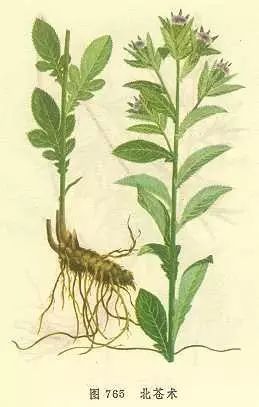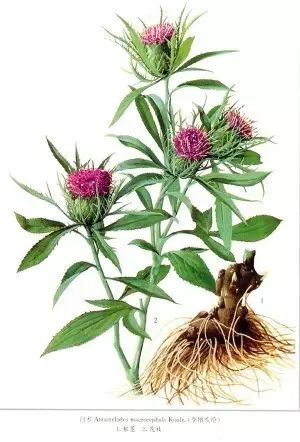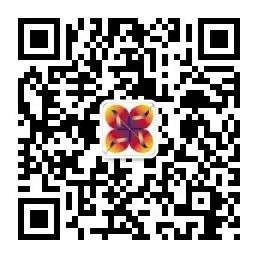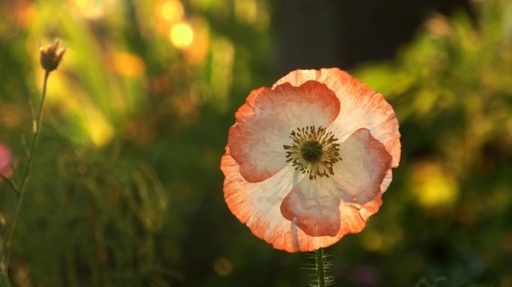For listeners who enjoy audiobooks, you can click below to listen to the audio.
Editor’s Note
|
Bai Zhu (Atractylodes macrocephala) and Cang Zhu (Atractylodes lancea) were historically referred to collectively as “Zhu”. Over time, they have been differentiated in medicinal use. The only difference in their names is one character, and both Bai and Cang imply color in Chinese, leading some to mistakenly believe they are the same herb. In fact, while both herbs have the functions of strengthening the spleen and drying dampness, Bai Zhu primarily supplements Qi and strengthens the spleen, making it a key herb for spleen deficiency. It is suitable for those with spleen deficiency and dampness accumulation leaning towards deficiency patterns. Cang Zhu, on the other hand, is primarily used to dry dampness and warm the spleen, making it a key herb for promoting spleen function, suitable for those with cold dampness obstructing the middle jiao leaning towards excess patterns. Today, we will discuss Bai Zhu and Cang Zhu. |
Cang Zhu and Bai Zhu are both classified as superior herbs in the “Shennong Bencao Jing” (Shennong’s Classic of Materia Medica), stating that they “can be used in decoctions. Long-term use leads to lightness of body, longevity, and no hunger.”
Cang Zhu
Cang Zhu is the rhizome of the Asteraceae family plants, such as Cang Zhu or Bei Cang Zhu, which can dry dampness, strengthen the spleen, dispel wind, scatter cold, and brighten the eyes. The “Bencao Gangmu” (Compendium of Materia Medica) states: “It treats damp phlegm retention, or when accompanied by blood stasis forming a mass, and for spleen dampness leading to turbid discharge and diarrhea, as well as intestinal wind.”

◎ Xu Shuwei’s “Self-Governance”
Xu Shuwei, a highly skilled physician from the Song Dynasty, was known for his diligence in studying late into the night. He had a habit of drinking before bed, perhaps believing in the saying, “A sip of wine before sleep can extend life to ninety-nine.” After several years, he began to experience stomach rumbling, pain in his side, reduced appetite, and would vomit bitter and sour gastric fluid every ten to fifteen days. In summer, only his right side would sweat while the left would not. What kind of strange illness was this? Xu Shuwei pondered deeply and sought treatment everywhere, but despite consulting many famous doctors, he found no relief, which caused him great distress. Therefore, he abandoned the belief that “doctors do not govern themselves” and began to save himself. He carefully analyzed his condition and concluded that it was primarily caused by “dampness obstructing the stomach.” Following his academic principle of “using medicine with precision,” he selected Cang Zhu as the main herb, using one pound of Cang Zhu powder, fifteen jujubes, and half an ounce of raw sesame oil to make small pills, taking fifty pills daily. He gradually increased the dosage to one hundred to two hundred pills per day. After several months of treatment, his strange illness gradually improved until he was completely cured.
Why did Cang Zhu have such a remarkable therapeutic effect on Xu Shuwei’s strange illness? It turned out that Xu Shuwei had a fondness for drinking, which harmed his spleen and stomach. When the spleen is deficient and does not function properly, water and dampness cannot be transformed, leading to “dampness obstructing the stomach” due to the interdependence of the spleen and stomach. This resulted in symptoms of internal dampness such as stomach rumbling, lack of sweating on the left side in summer, and vomiting gastric fluid. The spleen belongs to the earth element, which prefers warmth and fragrance. Cang Zhu has a fragrant aroma, is pungent, warm, and bitter, and enters the spleen and stomach meridians. The medicinal properties align perfectly. Cang Zhu can awaken the spleen and transform dampness, while dampness is a yin pathogen that can be transformed with warmth. Xu Shuwei accurately diagnosed his condition and selected the right herb, achieving miraculous results with just one herb. Additionally, his insistence on long-term medication and gradually increasing the dosage was also a thoughtful approach. He understood that dampness is sticky and difficult to eliminate quickly. Only by persisting with long-term medication and gradually increasing the dosage could he accumulate the medicinal power in his body and ultimately conquer the dampness.
Cang Zhu for Treating Rheumatism
The greatest efficacy of Cang Zhu is to strengthen the spleen and benefit dampness. Its flavor is particularly strong, with a potent spicy aroma that can dispel wind and scatter cold. In Traditional Chinese Medicine (TCM), Cang Zhu is often used to treat rheumatism.
In TCM, rheumatism is referred to as Bi syndrome, which occurs when the three pathogenic factors of wind, cold, and dampness combine to invade the body. Rheumatism can be classified into cold and heat types, but regardless of the type, Cang Zhu can be used for treatment.
Here is a small prescription for treating rheumatism: use thirty grams of Cang Zhu, ten grams of Gui Zhi (Cinnamon Twig), and thirty grams of Tou Gu Cao (Drynaria fortunei), boil with water, and soak the painful areas with the decoction. After soaking, you can also use a towel dipped in the medicinal liquid to apply to the painful areas.
Cang Zhu for Treating Diabetes
In TCM, high blood sugar is referred to as Xiao Ke (wasting-thirst), which has a certain correspondence with modern diabetes. TCM classifies diabetes patients into water-damp type and yin deficiency type. Patients with the water-damp type generally have a white tongue coating covering the entire tongue. The yin deficiency type primarily presents with symptoms such as a red tongue, thin and rapid pulse, frequent thirst, and obesity. The water-damp type of diabetes patients is particularly suitable for using Cang Zhu.
Shanghai’s old TCM practitioner Chen Shusheng summarized a prescription using Cang Zhu to eliminate dampness and treat diabetes—Cang Xuan Zhi Can. This prescription consists of thirty grams of Cang Zhu, fifteen grams of Xuan Shen (Scrophularia), along with some silkworm cocoons and thirty grams of black sesame, adjusted according to the patient’s symptoms.
Bai Zhu
Bai Zhu and Cang Zhu are slightly different; Cang Zhu has a stronger drying property and is more focused on dispelling dampness, thus often used for treating dampness obstructing spleen yang or heavy dampness causing “Bi syndrome”; Bai Zhu is more focused on strengthening the spleen, thus often used for spleen and stomach Qi deficiency. Bai Zhu can supplement the spleen, benefit the stomach, dry dampness, and harmonize the middle jiao, primarily treating symptoms such as weak spleen and stomach Qi, lack of appetite, fatigue, diarrhea, dizziness, spontaneous sweating, and fetal restlessness.

◎ Bai Zhu Resembling “Ruyi”
How can one distinguish between Cang Zhu and Bai Zhu? Bai Zhu was considered a symbol of good fortune in ancient times because its shape resembles a Ruyi (a traditional Chinese talisman), and it is very beautiful. Bai Zhu is yellow in color and has a fragrant taste, while Cang Zhu has a pungent taste. Cang Zhu is aggressive and does not stay in one place; it can “attack” but does not remain there; Bai Zhu, on the other hand, is defensive and does not move. One is primarily offensive while the other is defensive, making the combination of these two herbs very effective.
Bai Zhu’s “Gentleman’s Style”
The main effect of Bai Zhu is on the spleen and stomach; it not only strengthens the spleen and stomach but also controls gastric ulcers. Bai Zhu has a bidirectional regulating effect; when the spleen and stomach function is hyperactive, Bai Zhu can stabilize it; if the spleen and stomach function is low, Bai Zhu can invigorate it.
Many ancient prescriptions include Bai Zhu, the most famous being the Si Jun Zi Tang (Four Gentlemen Decoction), which consists of Ren Shen (Ginseng), Bai Zhu, Fu Ling (Poria), and Zhi Gan Cao (Honey-fried Licorice). Why is it called the Four Gentlemen Decoction? Because these four herbs work together to supplement the body’s righteous Qi, treating diseases in a very gentle manner. The philosophy of this formula is to first support the body’s righteous Qi rather than expel pathogens; when the righteous Qi is sufficient, the pathogens will naturally leave. The ancients said that if a room is filled with gentlemen, the petty people will not be able to stay. The treatment strategy of the Four Gentlemen Decoction is to regard the righteous Qi as the gentleman of the body; after supplementing the righteous Qi, the evil Qi will naturally flee.
In TCM, it is believed that “Qi is the commander of blood, and blood is the mother of Qi”; both Qi and blood are the fundamental substances that constitute the life activities of the human body. “Qi is the commander of blood” means that Qi can generate blood and move blood; “blood is the mother of Qi” means that blood is the carrier of Qi, and blood can generate Qi. The two are interdependent and mutually supportive. It is evident that Qi is very important as it governs the normal functioning of physiological mechanisms in the body. If the body experiences Qi deficiency, it will lead to weakness and fatigue. Most prescriptions used to supplement Qi are based on the Four Gentlemen Decoction.
Xue Lizhai’s Wonderful Use of Bai Zhu
In TCM, Bai Zhu is rarely used alone; it is often combined with Fu Ling and Ren Shen. During the Ming Dynasty, there was a physician named Xue Lizhai, who was a court physician. He studied diligently in the imperial medical institution and consistently ranked at the top during examinations, becoming a court physician in his twenties and eventually the head of the imperial medical institution. He was particularly skilled in Qi supplementation and was known as the founder of the “Wen Yang School”.
Xue Lizhai had a patient named Zhu Shao, whose condition was peculiar; he had a red face and blood in his stool, which easily led people to think of heat syndromes. Many doctors believed he should clear heat, but the prescribed medicines had no effect. Xue Lizhai believed that Zhu Shao’s symptoms were caused by Qi deficiency, where Qi could not secure the blood, leading to continuous blood in the stool. Therefore, he prescribed a Qi-supplementing formula, which included Ren Shen and Bai Zhu, along with some warming Yang herbs. After taking the medicine prescribed by Xue Lizhai, Zhu Shao’s blood in the stool quickly stopped.
In TCM, Bai Zhu is classified into Sheng Bai Zhu (raw Bai Zhu) and Chao Bai Zhu (fried Bai Zhu). Sheng Bai Zhu has a stronger diuretic effect. If treating gynecological conditions, such as insufficient Qi and blood production, Chao Bai Zhu is generally used because it has a milder effect. Nowadays, many young women suffer from irregular eating habits or dieting, harming their spleen and stomach, leading to reduced menstruation or even amenorrhea. In such cases, Chao Bai Zhu can be used to supplement the spleen. Additionally, Bai Zhu has a calming effect on pregnancy, but it should be used under a doctor’s guidance.
Children’s Salivation Treated with Bai Zhu
Children who frequently drool often do so due to spleen deficiency, which fails to secure saliva, leading to drooling during sleep. In this case, raw Bai Zhu can be ground into powder, and fifteen grams can be taken daily with a little sugar mixed in water.
Health Food Therapy from the Qing Palace—Eight Treasures Cake
The Eight Treasures Cake is a very important health food therapy in the Qing Palace. It is said that Emperor Qianlong consumed it almost daily for a period, and some researchers believe that his longevity is closely related to the Eight Treasures Cake. What magical ingredients are used in this Eight Treasures Cake? In fact, the Eight Treasures Cake is made based on the Four Gentlemen Decoction, adding several herbs: Dang Shen (Codonopsis), Bai Zhu, Fu Ling, Shan Yao (Chinese Yam), Yi Yi Ren (Job’s Tears), Qian Shi (Euryale), Lian Zi (Lotus Seed), and Bai Bian Dou (Hyacinth Bean). In the Qing Palace, the quantities of these eight herbs are equal. However, when we use it now, we can reduce the amount of Dang Shen slightly and keep the others equal. When we steam buns, we can also add some powdered Eight Treasures herbs to the flour, which is very beneficial for health.
It should be noted that those with a particularly red tongue and symptoms of deficiency heat should avoid eating the Eight Treasures Cake.
Author: Luo Dalun
Exciting Article Review
Why is empathy in psychology more persuasive than “reasoning”?
Ten great thought experiments: How great philosophers from ancient to modern times think about life.
Why do people refer to lifespan as Yang lifespan? A TCM perspective on life and death.
Seven short stories, each reminding me of my parents.
Master Cicheng Luozhu: What should you do when luck is not on your side?
66 Buddhist sayings on dealing with the world; remember one and it will benefit you for a lifetime.
Don’t feel constrained; everything is the best arrangement.
Don’t let irrelevant truths consume your life.
Love is not comfort and help, but silent understanding and acceptance.
Wang Yangming’s twelve methods of cultivating the heart: the highest essence of heart learning, beneficial for life.
Famous physician Wang Qingren’s Tongqi San treats thirty years of deafness and tinnitus.
Learn a formula daily – Huang Qi Bie Jia San (benefits Qi and nourishes Yin, clears virtual heat).
Huang Lian Decoction effectively treats various spleen and stomach diseases.
Seven years of internal injury headaches resolved by Wang Qingren’s Xuefu Zhuyu Decoction.
The ancient formula for phlegm and dampness, Er Chen Tang.
Zhengtong Rushi Decoction effectively resolves postherpetic neuralgia.
A formula to enhance memory, using four herbs to address forgetfulness, insomnia, and night sweats.
Field herb Ma Chi Xian can treat: herpes zoster, whooping cough, enteritis, hemorrhoids, acne, and pimples.
Three years of hair loss resolved by Wang Qingren’s Tongqiao Huoxue Decoction.
National Master Li Jinyong: Er Chen Tang can treat these fifteen diseases if used correctly.
The wisdom to resolve all of life’s troubles – the mirror principle.
Touching these parts of a child can help them quickly resolve emotions | A must-read for parents.
Our partners are Bodhisattvas in disguise.
Living like a baby is self-love.
Revealing the secrets of life: the two life systems of humans.
How does intention affect your health?
People do not die from diseases but from ignorance.
Ten signals from the body indicate you are too fatigued and need to rest.
Liu Feng discusses fasting, confirming that we are inherently sufficient, connecting with the highest wisdom (video + text).
What is the deepest love?
Famous Qing Dynasty formula for treating dizziness, hypertension, cerebral thrombosis, epilepsy, and facial paralysis – Ban Xia Bai Zhu Tian Ma Tang.
The combination of Bai Zhu and Cang Zhu can elevate clear Yang and eliminate spleen dampness, fundamentally improving fatigue and insufficient cerebral blood supply.
Bai Zhu Fu Zi Tang – Second chapter of the “Jin Gui Yao Lue” (Golden Chamber Essentials) on damp heat diseases – Lecture by Hu Xishu.
Shen Ling Bai Zhu San, a formula treating multiple diseases.
One herb cures heel pain (Bai Zhu decoction for foot baths).
Internal dampness leads to numerous diseases! To expel dampness, use Shen Ling Bai Zhu San with adjustments.
Learn about Chinese patent medicines daily – Shen Ling Bai Zhu Wan.
Sang Ye stops night sweats, while Bai Zhu relieves constipation.
Uncle JT slowly teaches – 44 – <药势> Bai Zhu.
The sixth volume of the story of grandfather and grandson in TCM – 06 – Bai Zhu.
Wang Sijin’s lecture on classical formulas – 112 – Gan Jiang, Sheng Jiang, Gui Zhi, and Bai Zhu Fu Ling Decoction.
Wang Sijin’s lecture on classical formulas – 86 – Gui Zhi, two Ma Huang, and Bai Zhu Fu Ling; Bai Zhu stops dampness and thirst, while Ren Shen stops dryness and thirst.
Wang Sijin’s lecture on classical formulas – 85 – Chai Hu Gui Zhi Gan Jiang Decoction; Chai Hu plus Long Gu and Mu Li Decoction; Bai Zhu: Ma Huang plus Zhu Decoction; Bai Zhu San; Gui Zhi Shao Yao Zhi Mu Decoction: treats swollen feet like falling off, lumbar disc herniation, and synovitis.
Wang Sijin’s lecture on classical formulas – 80 – Divine herb Gan Cao; Bai Zhu: supplements earth and dries dampness, treating both vomiting and diarrhea.
Wang Sijin’s lecture on classical formulas – 65 – Bai Zhu.
Wang Sijin’s lecture on classical formulas – 60 – Divine herb Bai Zhu.
Chinese medicine | Sheng Bai Zhu is better than Da Huang! The strongest treatment for spleen deficiency type constipation!
Comparative analysis of the differences and effects of Gui Pi Wan, Bu Zhong Yi Qi Wan, Fu Zi Li Zhong Wan, and Shen Ling Bai Zhu Wan.
The third volume of the story of grandfather and grandson in TCM – 42 – Cang Zhu.
The combination of Bai Zhu and Cang Zhu can elevate clear Yang and eliminate spleen dampness, fundamentally improving fatigue and insufficient cerebral blood supply.
The legend of Cang Zhu – Cang Zhu alone can resolve all symptoms | Xu Shuwei.
Discussion on Cang Zhu during epidemics – commonly used medicine for prevention and disinfection.
Uncle JT slowly teaches – 45 – Cang Zhu and the timing and differentiation of Ping Wei San.
Several methods of TCM for preventing epidemics during human pandemics (including: Cang Zhu drying dampness and anti-epidemic decoction and preventive agents).
The third volume of the story of grandfather and grandson in TCM – 42 – Cang Zhu.
Cang Zhu alone can resolve all symptoms.
========== END ==========
Warning:All articles published on this platform are for the purpose of popularizing TCM knowledge and are only for reference and learning by professional TCM practitioners. They do not constitute any prescriptions, recommendations, or guidance. Please do not blindly try medications; this platform does not bear any responsibility for any consequences arising from this. If necessary, please use under the guidance of a physician. All articles published on this platform only represent the author’s views.
⊙ Copyright Statement: The article is sourced from the internet; if there is any infringement, please contact us for removal.
Advertisements are randomly distributed by the system, and we cannot control or select them in detail. Please do not purchase any animal products or meat. Do not buy fishing or hunting equipment, refuse to kill. Do not play violent games; violent games are fundamentally similar to actual killing; do not read pornographic articles; all evil stems from lust, and sexual misconduct is the root of reincarnation and disaster. Cause and effect are inseparable. Remember!
Better to let the medicine gather dust on the shelf than to wish for no illness in the world!
As a parent, not knowing medicine is unkind! As a child, not knowing medicine is unfilial!
Can’t find a good TCM practitioner? Why not learn TCM yourself!
In the menu of this account, there is a complete introductory series and video series. Everyone is welcome to learn.
Learning ancient TCM, inheriting the classics of Shang Han Lun.
Virtue carries all things! Herbs and minerals only remove physical ailments; cultivating virtue is the way to eliminate mental demons!
Wishing: Peace and harmony in the world, clear sun and moon; timely wind and rain, no disasters; a prosperous nation and peaceful people, no need for weapons; promoting virtue and kindness, diligently practicing propriety; no thieves in the country, no grievances; the strong do not bully the weak, everyone gets their due; no illness or misfortune, wealth and health; longevity and good virtue, starting and ending well.
 Long press for 2 seconds to follow Qibo Youdao
Long press for 2 seconds to follow Qibo Youdao
Welcome to share the content of this account widely.

